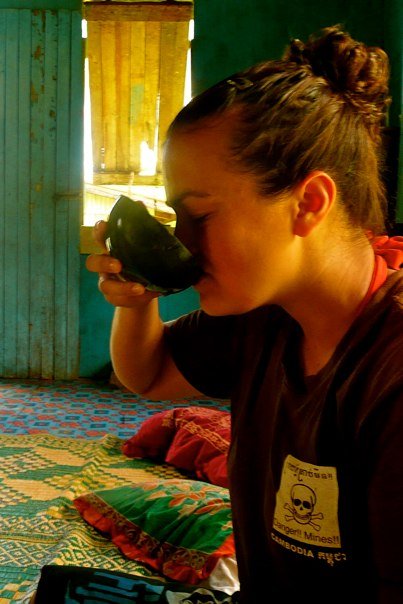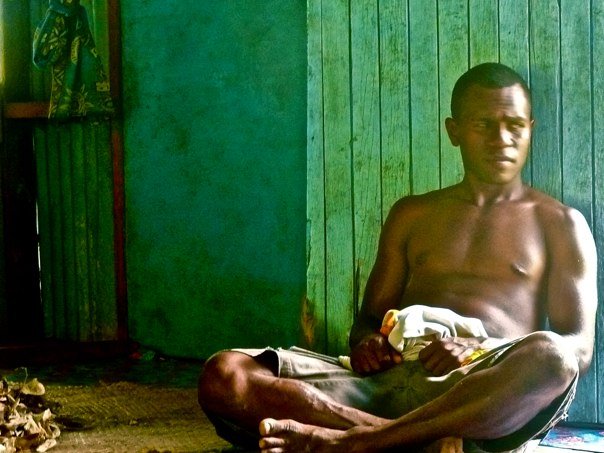How does that make you feel?Go on...let it out. It's okay to feel these feelings. Let's talk about that...
We all shake our heads at the shoulder-patting, "aww gee"-inspiring cliches from the psychology world, but there's no doubt they come from a necessary concept. When the traumatic, the all-of-a-sudden, the shocking occurs, our heads are wired to be in denial but eventually come to terms with that which changes irrevocably, and death is certainly in that category of things in desperate need of processing.
In the Wake of Death

After the tear-powered funeral and another communal lunch in the hall, all the kids decided to go for a swim in the muddy Luva river, thanks to the prior week of sobbing skies. We proceeded to frolic for something like five hours, all the while keeping our eyes on the kids who only hours prior buried their father. Eldest Mario continued to laugh with the same Goofy-esque chortle as he chased his cousins in a game of "He" (Fijian "tag"). The rest rolled sand balls to be thrown at passing runners and smiled off the cliff jumps.
I couldn't imagine being so jovial the same day I buried my father. I put on my anthropologist cap and observed.
Chasing after those with fast feet, burying teenagers in sand up to their nostrils, dropping sand clumps into little boys underwear - the entire group had an absolute ball playing together. It was magnificent. Girls of eighteen got along swimmingly with boys of eight years-old. There were no age barriers in the mix, and everyone seemed to have put the day's events behind them for the time being. Additional kids trickled in as the games continued, but no one left in shifts. Once everyone was thoroughly tapped, we gathered our flip-flops and returned to the village en masse.
It was an experience worthy of marveling.

Upon our arrival back to Nakavika, every vacant house had concentric circles of adults around the kava bowl. Mounds of used kava powder formed outside the doorways, heaps the size of gargantuan termite colonies. A steady stream of tired souls walked slowly to the muddy creek to fill the buckets for more kava consumption - luckily the clarity would soon be masked by the additional ingredient.
Dictated by Fijian manners, every host had to serve bowl after bowl of kava until the guest retired to slumber. And with tolerances rivaling Ozzy and Jagger, that hour rarely struck before the wee ones of the morning. The conversations inevitably got to the topic of surreal visions, because soon the whole village had similar night terrors of Elias walking amongst the living. Even though they were present to support each other, no one other than the priest seemed to attempt explanations of it all to ease the worried minds.
It was a bad combination of influences causing everyone to suffer trauma and confusion, and sadly, it was about to get too scary for us.
The Hike That Turned Sour
The following day, Abel was ready to commence with his Nakavika Project involvement: coordinating morning events to educate the volunteers on Fijian life. Along with Paul and Ben, the six of us departed on a hike through the Fijian bush to visit the old foundations of Nakavika and the neighboring town of Navunikabi. Neil Young's words were spot on:
The heat was hot ...but the air was full of sound.
The views were as I remembered them; of lush, green undulating hills where everything grew on anything. Remembering my previous issue with hiking in clay, I wore my thick socks inside rain boots and bounded with much less hassle (aside from my still-open, still-delicious bacterial sores). We drank fresh water out of bamboo shoots, brushed white spiders off our arms, and got a much more personalized history lesson on Nakavika now that we knew every character by name.

We paused from all the river forging to eat our lunch of tuna, crackers, and peanut butter (not altogether, unless you were Paul). We arrived in Navunikabi a few hours after departing Nakavika, and with Jackie and Garrett having never been formally welcomed to the village, the chief's son wanted to host a sevusevu in what can only be described as his bachelor pad (read mad stereo system). We were happy to take part in the one-round ceremony and meet the friends of our friends.
Three hours later, our bloods were boiling.
Living on our own, Garrett and I had assumed we'd be back by early afternoon in time to do some much-needed laundry, cook ourselves dinner, and conduct class with the kids. Jackie was anxious to witness the first class we could hold above a mouse squeak. The kava session turned into a three mix affair where the boys continued to thank us for allowing the reunification of friends from childhood.
When asked, "How often do you guys come to Navunikabi?" they replied, "Once or twice a week." When asked, "How often do you see these friends?" they mumbled, "every time."
They could have been continuing the process of mourning, chatting about Elias and working out their issues, but the amount of tension still infused in their bones and attitudes led us to believe it wasn't what we would equate to a healthy gab session of problems.
I stared at cigarette smoke while dozing on the floor mat. Jackie conked out for a good hour or two. Garrett twiddled his thumbs and took pictures of himself. They wanted to enjoy some kava, and it came at the expense of our afternoons (a concept that didn't translate between our cultures).
It was yet another issue of relativity and timeliness that got under our skins, justification unknown.
The kava affected the three boys in different ways. Ben was quiet and pensive. Paul became distracted, spastic, and dismissive at every turn, suggestion, or concern. And Abel adopted the I-Do-What-I-Want mindset, intermixed with kindness and aggressive disagreement. None of our navigators made us feel particularly comfortable, somewhat stranded there in the jungle, and I took the opportunity to pull Abel aside and calmly but assuredly state our issues.
He took it well, I thought. I put on my best diplomatic hat and thought I bridged a gap with the potential to last the test of time. Instead I think the conversation, the kava, and the recent events of the week pushed him over the edge.
The Game Changing Moment
This is the point in the story where I have to leave out a pivotal moment of our experience in Nakavika, the result of which made us realize our project may not be able to work. The spokesman asked that I not share it, as it wasn't an accurate representation of the village majority. I agreed to honor his request. However, not noting here that something occurred would leave the rest of the story a confusing mess and our reasons for skepticism with the project unspecified.
It involved trust, responsibility, friendship, and most notably, alcohol abuse.

Unfortunately, the ways in which some people process the stressful and difficult in their lives is more destructive than anything else. Not feeling those feelings, not voicing concerns, not understanding the facts about their bodies, their minds and the realities of the world are dangerous catalysts to greater problems. Just as much as I know humans can exhibit the utmost strength, humans can easily be very weak.
We openly claimed some of the blame (the pressures and requests we voiced for the sake of the project), but the village elders assured us we were not in the wrong. And they proved to us beyond a doubt that one definitely does not define the whole. The next day was filled with shock, surreal experiences, and above all, comfort from our village friends. It was established we were welcome in the village, regardless of words or actions witnessed in the previous hours.
It is because of this event that I describe to friends our time in Nakavika as "dramatic."
Garrett, Jackie, and I took the next carrier ride out of the village for a breather.


